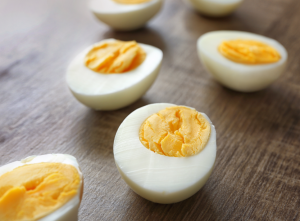Hard boiled eggs are a convenient and nutritious snack. They can be turned into a stand-alone protein snack, deviled eggs, egg salad or garnish on a salad. For many years, people quit eating hard boiled eggs because of the cholesterol content. Now, research has shown that not only is the cholesterol content in eggs nothing to worry about, but eating hard boiled eggs can actually lower your bad cholesterol levels. All the more reason to finally learn how to make the perfect hard boiled egg!
Knowing how to hard boil an egg is a must in the kitchen. Cook them too long and the edges of the yolk will turn green and develop a sulfur taste. Don’t cook them long enough and the yolk will be runny when you cut or bite into the egg. You also want to be able to easily peel the egg shell away from the egg. How do you master the perfect hard boiled egg?

Cooking the Eggs
When you hear the phrase ‘hard boil an egg’, you probably picture an egg that is cooked at a rolling boil for several minutes. This is one of the best ways to quickly overcook an egg. If you want eggs that are perfectly cooked and easy to peel, the process is much quicker.
Start by gently placing eggs into a saucepan in a single layer on the bottom. Be careful when laying the eggs in the pan so that you don’t crack them. A saucepan should hold half a dozen eggs. If you’re cooking more than that, you’ll want to use a larger pot. Cover the eggs with cold water. For half a dozen eggs, cover them with one inch of water. A dozen eggs should be covered with 2 inches of water.
Place the saucepan on the stove and turn the heat on high. Bring the water to a rolling boil.
Once the eggs are at a rolling boil, cover the pan with a lid and turn the heat off. Leave the pan on the hot eye for 10-12 minutes. The hot water and hot eye will stay hot long enough to cook the eggs.
To fully cook a hard boiled egg, you’ll want to wait closer to 12 minutes. If you like your boiled eggs to be slightly soft, check them at 10 minutes.
Larger eggs will need more time to cook than smaller ones. Adjust your cooking time as needed. I like to pull an egg out and use it as a test egg to see how done it is.
When your eggs are cooked, you can pour the hot water out of the pan and run cold water over the eggs. This will make it easier to handle the eggs and remove the shells.
Working with Farm Fresh Eggs
Fresh eggs are notorious for being more difficult to peel. If you’re finding your eggs hard to work with, try these tips to make them easier to peel.
When you’re cooking boiled eggs, use eggs that aren’t as fresh. Fresh eggs have strong membranes that connect the shell to the outer layers of the egg white, making them harder to peel. One reason that store bought eggs are so easy to peel is because they’re usually at least one week old by the time you purchase them and bring them home. The membrane between the shell and egg white breaks down over time, meaning older eggs are easier to peel than fresher eggs.
The process of hard boiling eggs cooks the egg from the outside in, which can make the membrane cook to the egg white. An easy way to get around this is to steam your eggs rather than hard boil them. Place the eggs in a steamer basket in a pan with one inch of water. Bring the water to a rolling boil. Cover the pan with a lid and continue to steam the eggs for 15 minutes.
Egg shells are porous. The steam will enter the pores and help separate the shell from the egg. This works well with fresh eggs or farm eggs. You may need to adjust your steaming cook time to find the perfect time for your farm eggs. Monitor your eggs to make sure that the pan doesn’t run out of water.
You’ll find many articles online that mention using vinegar or salt to make eggs peel easier. You’ll also find an equal number of articles that mention these methods aren’t effective. Needless to say, take these articles with a ‘grain of salt’. They’re worth trying if you have really tough eggs to tackle.
Another tip that doesn’t get as much attention is adding a pinch of baking soda into the cooking water. Baking soda changes the pH of the water and can help the membrane under the shell break away from the egg easier.